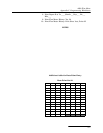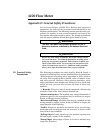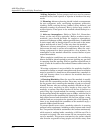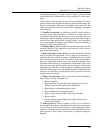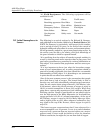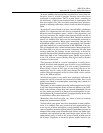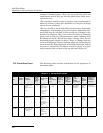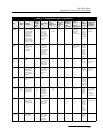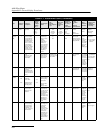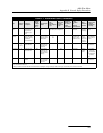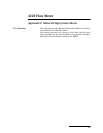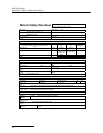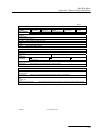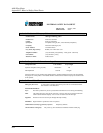
4220 Flow Meter
Appendix D General Safety Procedures
D-7
Carbon
Dioxide
CO
2
Asphyxiant, Col-
orless, odorless.
When breathed
in large quanti-
ties, may cause
acid taste.
Non-flammable.
Not generally
present in dan-
gerous amounts
unless an oxygen
deficiency exists.
1.53 Cannot be
endured at 10%
more than a
few minutes,
even if subject
is at rest and
oxygen content
is normal. Acts
on respiratory
nerves.
40,000
to
60,000
5,000 — — At bottom;
when heated
may stratify
at points
above bottom.
Products
of com-
bustion,
sewer gas,
sludge.
Also issues
from car-
bonaceous
strata.
Oxygen
deficiency
indicator
Carbon
Monox-
ide
CO Chemical
asphyxiant. Col-
orless, odorless,
tasteless.
Flammable.
Poisonous.
0.97 Combines with
hemoglobin of
blood. Uncon-
sciousness in
30 min. at 0.2%
to 0.25%. Fatal
in 4 hours at
0.1%. Head-
ache in few
hours at 0.02%.
400 50 12.5 74.0 Near top, espe-
cially if present
with illuminat-
ing gas.
Manufac-
tured gas,
flue gas,
products
of com-
bustion,
motor
exhausts.
Fires of
almost any
kind.
CO ampoules.
Carbon
Te tra-C h l
oride
CCl
4
Heavy, ethereal
odor.
5.3 Intestinal
upset, loss of
consciousness,
possible renal
damage, respi-
ratory failure.
1,000
to
1,500
100 — — At bottom. Industrial
wastes,
solvent,
cleaning
Detectable
odor
at low concen-
trations.
Chlorine Cl
2
Irritant. Yel-
low-green color.
Choking odor
detectable in very
low concentra-
tions. Non-flam-
mable.
2.49 Irritates respi-
ratory tract.
Kills most ani-
mals in a very
short time at
0.1%.
4 1 — — At bottom. Chlorine
cylinder
and feed
line leaks.
Detectable
odor at low
concentra-
tions.
Formal-
dehyde
CH
2
O Colorless, pun-
gent suffocating
odor.
1.07 Irritating to the
nose.
— 10 7.0 73.0 Near bottom. Incom-
plete com-
bustion of
organics.
Common
air pollut-
ant, fungi-
cide.
Detectable
odor.
Gasoline C
5
H
12
to
C
9
H
20
Volatile solvent.
Colorless. Odor
noticeable at
0.03%. Flamma-
ble.
3.0
to
4.0
Anesthetic
effects when
inhaled. Rap-
idly fatal at
2.4%. Danger-
ous for short
exposure at 1.1
to 2.2%.
4,000
to
7,000
1,000 1.3 6.0 At bottom. Service
stations,
garages,
storage
tanks,
houses.
1. Combusti-
ble gas indi-
cator.
2. Oxygen
deficiency
indicator.**
Hydrogen H
2
Simple asphyx-
iant. Colorless,
odorless, taste-
less. Flammable
0.07 Acts mechani-
cally to deprive
tissues of oxy-
gen. Does not
support life.
— — 4.0 74.0 At top. Manufac-
tured gas,
sludge
digestion
tank gas,
electroly-
sis of
water.
Rarely
from rock
strata.
Combustible
gas indicator.
Hydrogen
Cyanide
HCN Faint odor of bit-
ter almonds.
Colorless gas
0.93 Slight symp-
toms appear
upon exposure
to 0.002% to
0.004%. 0.3%
rapidly fatal.
— 10 6.0 40.0 Near top. Insecti-
cide and
rodenti-
cide.
Detector tube
Table D-1 Hazardous Gases (Continued)
Gas
Chemical
Formula
Common
Properties
Specific
Gravity
or Vapor
Density
Air =1
Physiological
Effect
Max
Safe 60
Min. Exposure
ppm
Max. Safe
8 Hour
Exposure
ppm
Explosive
Range (% by
vol. in air)
Limits
lower/upper
Likely
Location
of
Highest
Concentration
Most
Common
Sources
Simplest and
Cheapest
Safe Method
of Testing



